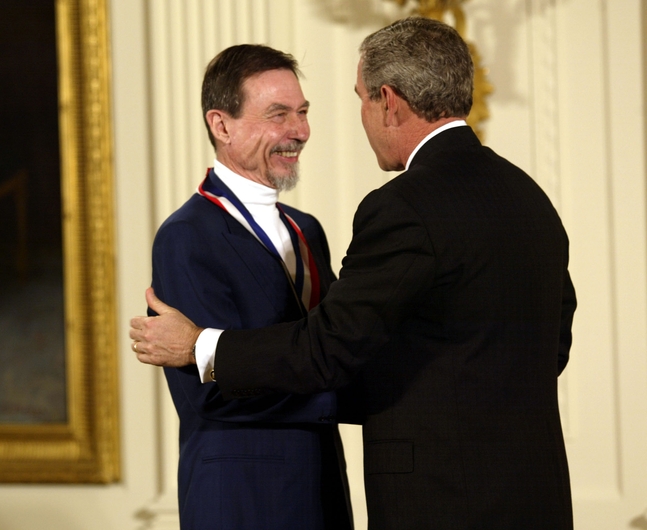Honors and Awards

Carver Mead receiving the 2002 National Medal of Technology
from President Bush.
Photo Credit: White House Press Photo
http://nationalmedals.org/laureates/carver-a-mead
2022
The Inamori Foundation's Kyoto Prize 2022 in Advanced Technology, for "leading contributions to the establishment of the guiding principles for VLSI systems design." [link]
2015
Fellow, National Academy of Inventors (NAI) for his “unparalleled commitment to excellence in academic invention.”
2011
The Frontiers of Knowledge Award in the Category of Information and Communication Technologies, presented by Banco Bilbao Vizcaya Argentaria (BBVA), for being “the most influential thinker and pioneer” of the silicon age and for enabling “the development of the billion-transistor processors that drive the electronic devices---for example, in laptops, tablets, smartphones, DVD players---ubiquitous in our daily lives.” [link]
2009
Inductee, National Inventors Hall of Fame.
2003
The National Medal of Technology, the nation’s highest honor for technological innovation, awarded by President George W. Bush. Mead was presented the award "for pioneering contributions to the microelectronics field, that include spearheading the development of tools and techniques for modern integrated-circuit design, laying the foundation for fabless semiconductor companies, catalyzing the electronic-design automation field, training generations of engineers that have made the United States the world leader in microelectronics technology, and founding more than 20 companies including Actel Corporation, Silicon Compilers, Synaptics, and Sonic Innovations.” [link]
The Founders Award, National Academy of Engineering, for "visionary contributions in the field of microelectronics, including VLSI technology and computational neural systems." Acceptance Remarks: [link]
2001
The Dickson Prize in Science, awarded by Carnegie Mellon University, for “pioneering inventions and work that has helped to power the information age.”
1999
The Lemelson-MIT Award, presented by the Lemelson Foundation and the Massachusetts Institute of Technology, “For his many contributions to the field of microelectronics, which have led to a new business model for the industry and enabled a new wave of innovation in information technology.” [link]
1997
Allen Newell Award, awarded by the Association for Computing Machinery (ACM), “For career contributions within the field of computer science, and for contributions bridging computer science and other disciplines.” [link]
1996
Phil Kaufman Award, presented by Electronic Design Automation Companies (EDAC), “For innovative contributions to design tool technology of benefit to electronic systems and IC designers.”
IEEE John Von Neumann Medal, The Institute of Electrical and Electronics Engineers, “For leadership and innovative contributions to VLSI and creative microelectronic structures.”
1994
Secretary of the Navy Captain Robert Dexter Conrad Award, presented by Department of the Navy, “In honor of the Navy’s highest recognition of scientific achievement.”
1992
Award for Outstanding Research, International Neural Network Society (INNS).
1991
Honorary Degree, Doctor of Science, presented by The University of Southern California, “In recognition of distinguished achievement.”
1990
Best Paper Award, IEEE Signal Processing Society, “For the paper co-authored with Richard F. Lyon, entitled ‘An Analog Electronic Cochlea’.”
Walker-Ames Distinguished Visiting Professor, University of Washington.
1989
Election to Membership, National Academy of Sciences (Primary Section: Engineering Sciences)
1988
Citation for Exceptional Contributions to Science, Technology and Education, presented by Exploratorium, “For visionary contributions to the fields of microelectronics and computer science, and for encouraging the advancement of science and technology through his distinguished role as a teacher.”
1987
Walter B. Wriston Public Policy Award, presented by the Hudson Institute, “For his role as an innovator and visionary thinker in the fields of technology and electronics.”
Honorary Doctorate, The University of Lund, “In recognition of his breakthrough in the development of structured methods for construction of microelectronic systems, and his enthusiastic work in spreading this technology.”
1985
The Harry Goode Memorial Award, presented by The American Federation of Information Processing Societies, “In recognition of his pioneering contributions to the research and education of very large scale integration (VLSI) design.”
The John Price Wetherhill Medal (with Lynn Conway), presented by the Board of Managers of The Franklin Institute, “In consideration of the major impact of their method of obtaining silicon chips in small quantities at reasonable cost.”
1984
Member, National Academy of Engineering, Electronics, Communication & Information Systems (Computer Science & Engineering). "For great insight into the problems and potentialities of VLSI, and for helping to advance the art."
Harold Pender Award (with Lynn Conway), presented by The Faculty of the Moore School of Engineering, University of Pennsylvania, “For his insight into the potential of VLSI, for his development of CAD techniques for VLSI technology, for his co-authoring of the most respected VLSI textbook to date, and for his contributions to the state-of-the-art of this field.”
IEEE Centennial Medal, presented by The Institute of Electrical and Electronics Engineers, “For extraordinary achievement.”
1981
The Electronics Achievement Award, shared with Lynn Conway, presented by the Editors of Electronics Magazine, “For their work in structuring the methodology of the design of very large scale integrated circuits, summed up in the basic textbook on the subject, Introduction to VLSI Systems.”
1971
T.D. Callinan Award, presented by The Electrochemical Society, “In recognition of an outstanding contribution to the literature of dielectrics.”